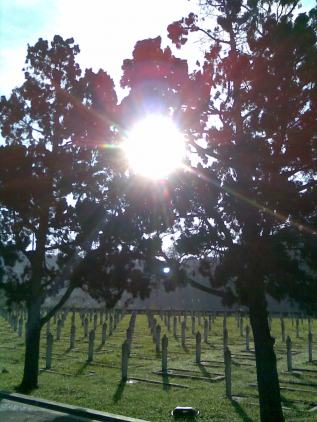It was on one of the episodes that Tariq Aziz either introduced a
guest who had written the entire Quran in his own hand, or spoke about
someone who had done so. Mummy was struck by something he said at the
time…something along the lines of God giving everyone the ‘naik taufeeq’
(good intentions) to do something similar….
And that’s all the impetus Mummy needed.
She decided she would write the Quran too.
All she had to bank on was her ability to write neatly and with
precision, a skill that earned her a good reputation amongst her
teachers at school. That, and her intrinsic willfulness that carries her
through the most nitpicky tasks.
She was untrained in the art of calligraphy, but that didn’t faze
her….she just sent my father to buy her a bunch of flat-nibbed pens and
some pretty bordered paper and set to work.
It took her around five years to complete the task at hand, page by
painstaking page. It was very difficult going, and for my mom to say
something like that tells you a lot. She had to write with grave
concentration, as even one mistake meant she would have to do the entire
page all over again. This she learnt the hard way.
So she wrote in the mornings when she was at her freshest, and even
then for just half an hour, as that was the most she could manage.
So this gem of an endeavour, this testament of Mummy’s faith and
tenacity, has been bound and covered in ochre velvet and lies on a shelf
in the house, unseen, and largely unremarked. Family and some friends
are all who know about Mummy’s hand-written Quran.

What matters hugely to my mother is the fact that she managed to show her work to the spiritual leader of o
ur community of Dawoodi Bohras, Syedna Mohammed Burhanuddin, whom she humbly requested to inscribe in his own hand, the opening phrase…

In the name of Allah, the most Beneficent, the most Merciful.
This Arabic phrase is spoken before
embarking on anything significant, and having the ‘Bismillah’ written by
Maulana was a foregone conclusion in Mummy’s scheme of things…..which
is why she left those areas blank, until the opportunity came along….
it had been written in blue ink but had faded over time, so Mummy went over it with a gold pen
Syedna
Burhanuddin
wrote the first Bismillah in his inimitable script atop the Surah e
Fateha, and then, to the surprise of all present, passed it on to his
second son, Shehzada Mufaddal Bhaisaheb, to grace the beginning of the
first chapter with a Bismillah of his own…..a move that sparked a buzz
in the family as being something rather significant.
That was around 15 years ago..
Recent events have revealed the foresight
and wisdom of Syedna Burhanuddin, a fragile yet powerful presence in our
lives, whose centenary we all celebrated the world over, just a few
months ago.
in the hand of Syedi Mufaddal Bhaisaheb
Mummy’s Quran will have the honour and
distinction of being inscribed by two Da’i's, Syedna Mohammed
Burhanuddin, and his successor, now titled Syedi Mufaddal Bhaisaheb
Saifuddin.
She has also stuck on the first page an
autograph she procured sometime in the late 50′s, when she was still a
school girl, of Syedna Taher Saifuddin…..the eminent and much-loved
father of Syedna Mohammed Burhanuddin.

a revered autograph

this is stuck right above....

...this.

the first page...

the last page..

and all that lies betwixt..

the 100 names of Allah

Surah e Lahab


pages...


...and then some
And to think Mummy has Neelaam Ghar and Tariq Aziz to thank for the inspiration.
 sumber dari: munirazoom.wordpress.com
sumber dari: munirazoom.wordpress.com


















